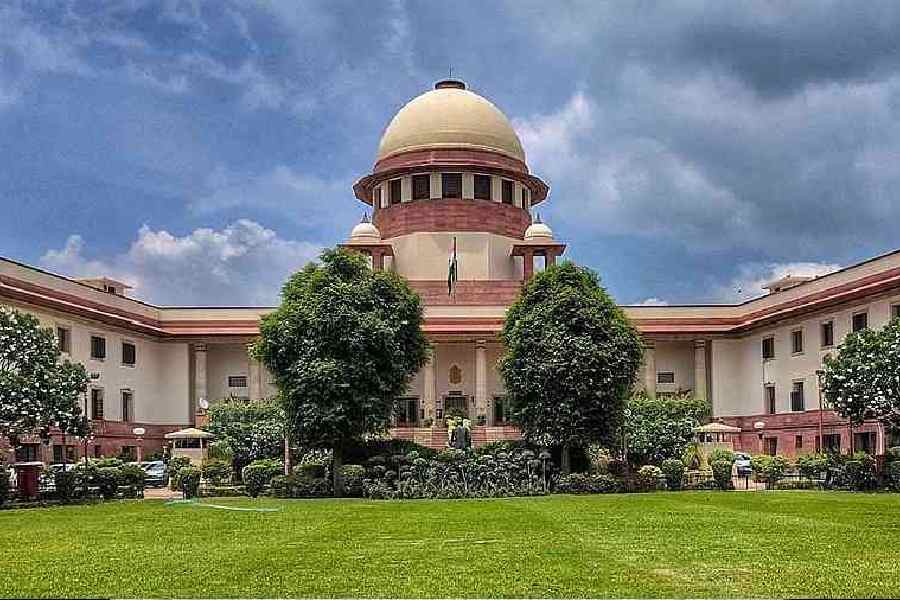The Supreme Court on Tuesday held as "illegal" two notifications by the Centre granting extension of service, for one year each time, to Indian Revenue Service officer Sanjay Kumar Mishra as the chief of the Enforcement Directorate.
However, the top court upheld the amendments made to the Central Vigilance Commission (Amendment) Act, 2021 and the Delhi Special Police Establishment (Amendment) Act, 2021 as well as to the Fundamental (Amendment) Rules, 2021 by which the government can give a maximum of five-year tenure to CBI and ED chiefs.
A bench of Justices BR Gavai, Vikram Nath and Sanjay Karol said in view of the peer review being conducted by the Financial Action Task Force (FATF) this year, and to enable smooth transition, Mishra's tenure will be till July 31.
FATF is a global body that leads action to tackle money laundering, terrorist and proliferation financing.
"The impugned orders dated November 17, 2021 and November 17, 2022 granting extensions to the tenure of the respondent No.2- Sanjay Kumar Mishra for a period of one year each are held to be illegal," the bench said, while partially allowing the writ petitions challenging the extension given to the officer.
The 1984-batch IRS officer was otherwise to remain in office till November 18, 2023, according to the notification issued by the government.
The bench said though the court has held that orders dated November 17, 2021 and November 17, 2022 granting extensions to Mishra are not valid in law, it is inclined to take into consideration the concern expressed by the Union of India with regard to FATF review.
"We are further inclined to take into consideration that the process of appointing the Director of Enforcement is likely to take some time. In that view of the matter, we find that in order to ensure the transition to be smooth in the larger public interest, it will be appropriate to permit respondent No.2 to continue to be in office till July 31, 2023," the top court said.
The bench said the scope of judicial review in a legislative action is very limited and it can be interfered with only on three grounds--as to whether legislature was competent enough to legislate on the subject, whether it affects any fundamental right, and manifest arbitrariness.
"We have found that the legislature is competent to legislate on the subject, and secondly there is no violation of any fundamental rights, and thirdly there is no manifest arbitrariness," it said.
The bench, in its 103-page verdict, said the challenge to Central Vigilance Commission (Amendment) Act, 2021 and the Delhi Special Police Establishment (Amendment) Act, 2021 as well as to the Fundamental (Amendment) Rules, 2021 is rejected and the writ petitions are dismissed to that extent.
It referred to the 2021 verdict of the top court by which the Centre's power to extend Sanjay Kumar Mishra's tenure as the ED Director was upheld but pointed out the court had clarified that extension of service of officers after the age of superannuation should be done only in rare and exceptional cases.
The bench said in the 2021 verdict, this court had not struck down any law, but issued a mandamus (judicial writ issued as a command) which was binding on the parties before it.
"It could, thus, clearly be seen that this Court has held that the effect of the judgments of this court can be nullified by a legislative act removing the basis of the judgment. It has further been held that such law can be retrospective. It has, however, been held that retrospective amendment should be reasonable and not arbitrary and must not be violative of the fundamental rights guaranteed under the Constitution," the bench said.
It said the court has held that the defect pointed out should have been cured such that the basis of the judgment pointing out the defect is removed.
"This Court has, however, clearly held that nullification of mandamus by an enactment would be impermissible legislative exercise. This Court has further held that transgression of constitutional limitations and intrusion into the judicial power by the legislature is violative of the principle of separation of powers, the rule of law and of Article 14 of the Constitution of India," the bench said, adding that the basis of the 2021 verdict was not taken away.
It said the apex court has specifically issued a mandamus that no further extension shall be granted to Mishra in its 2021 verdict.
"The Union of India and the respondent No.2 (Mishra) were both parties in the proceedings before this Court in the [Common Cause (2021 verdict)]. The mandamus issued to be parties was binding on them. We, therefore, find that the respondent No.1 (Union of India) could not have issued orders dated November 17, 2021 and November 17, 2022 in breach of the mandamus issued by this Court vide its judgment dated September 8, 2021 in Common Cause (2021)," the bench said.
The top court had on December 12, 2022 sought the response from the Centre and others to a plea challenging the third extension granted to Mishra.
It had issued notices to the Union of India, the Central Vigilance Commission and the ED director on a plea filed by Jaya Thakur which accused the central government of destroying the basic structure of democracy by misusing the enforcement agencies against its political opponents.
The bench gave the verdict on a batch of petitions, including those filed by Congress leaders Randeep Singh Surjewala and Thakur, and TMC's Mahua Moitra and Saket Gokhale.
Mishra, 62, was first appointed the ED director for two years on November 19, 2018. Later, by an order dated November 13, 2020, the central government modified the appointment letter retrospectively and his two-year term was changed to three years.
The government promulgated an ordinance last year under which the tenure of the ED and CBI chiefs could be extended by up to three years after the mandated term of two years.
Except for the headline, this story has not been edited by The Telegraph Online staff and has been published from a syndicated feed.











